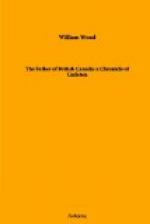For three months the prospect, though worse than he had anticipated, did not seem utterly hopeless. It had been considerably brightened by Rodney’s great victory over the French fleet which was on its way to attack Jamaica. But an unfortunate incident happened to be exasperating Loyalists and revolutionists at this very time. Some revolutionists had killed a Loyalist named Philip White, apparently out of pure hate. Some Loyalists, under Captain Lippincott, then seized and hanged Joshua Huddy, a captain in the Congress militia, out of sheer revenge. A paper left pinned on Huddy’s breast bore the inscription: ’Up goes Huddy for Philip White.’ Washington then demanded that Lippincott should be delivered up; and, on Carleton’s refusal, chose a British prisoner by lot instead. The lot fell on a young Lieutenant Asgill of the Guards, whose mother appealed to the king and queen of France and to their powerful minister, Vergennes. The American Congress wanted blood for blood, which would have led to an endless vendetta. But Vergennes pointed out that Asgill, a youth of nineteen, was as much a prisoner of the king of France as of the Continental Congress. At this the Congress gnashed its teeth, but had to give way.
While the Asgill affair was still running its course, and embittering Loyalists and rebels more than ever, Carleton was suddenly informed that the government had decided to grant complete independence. This was more than he could stand; and he at once asked to be recalled. He had been all for honourable reconciliation from the first. He had been particularly kind to his American prisoners in Canada and had purposely refrained from annihilating the American army after the battle of Three Rivers. But he was not prepared for independence. Nor had he been sent out with




